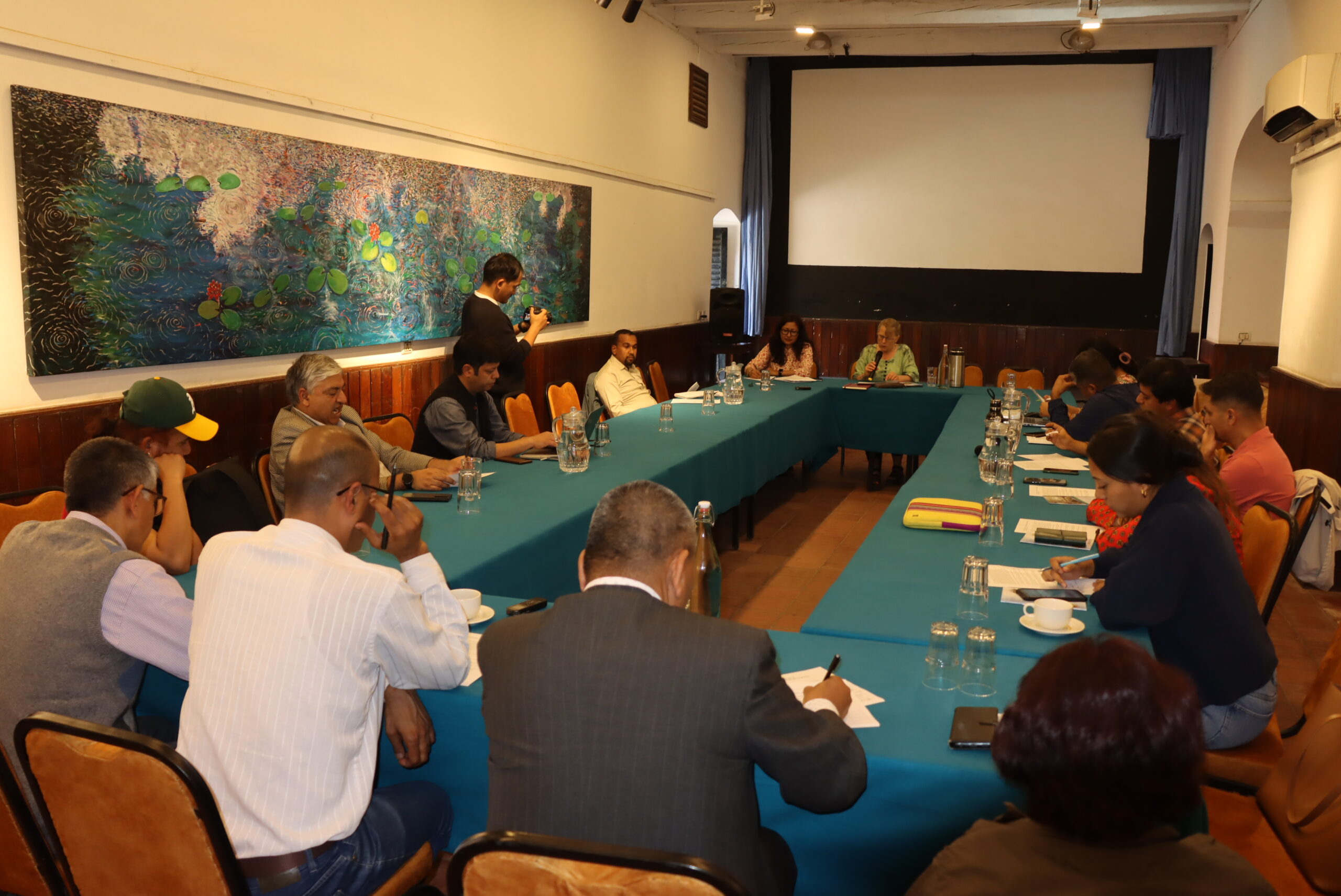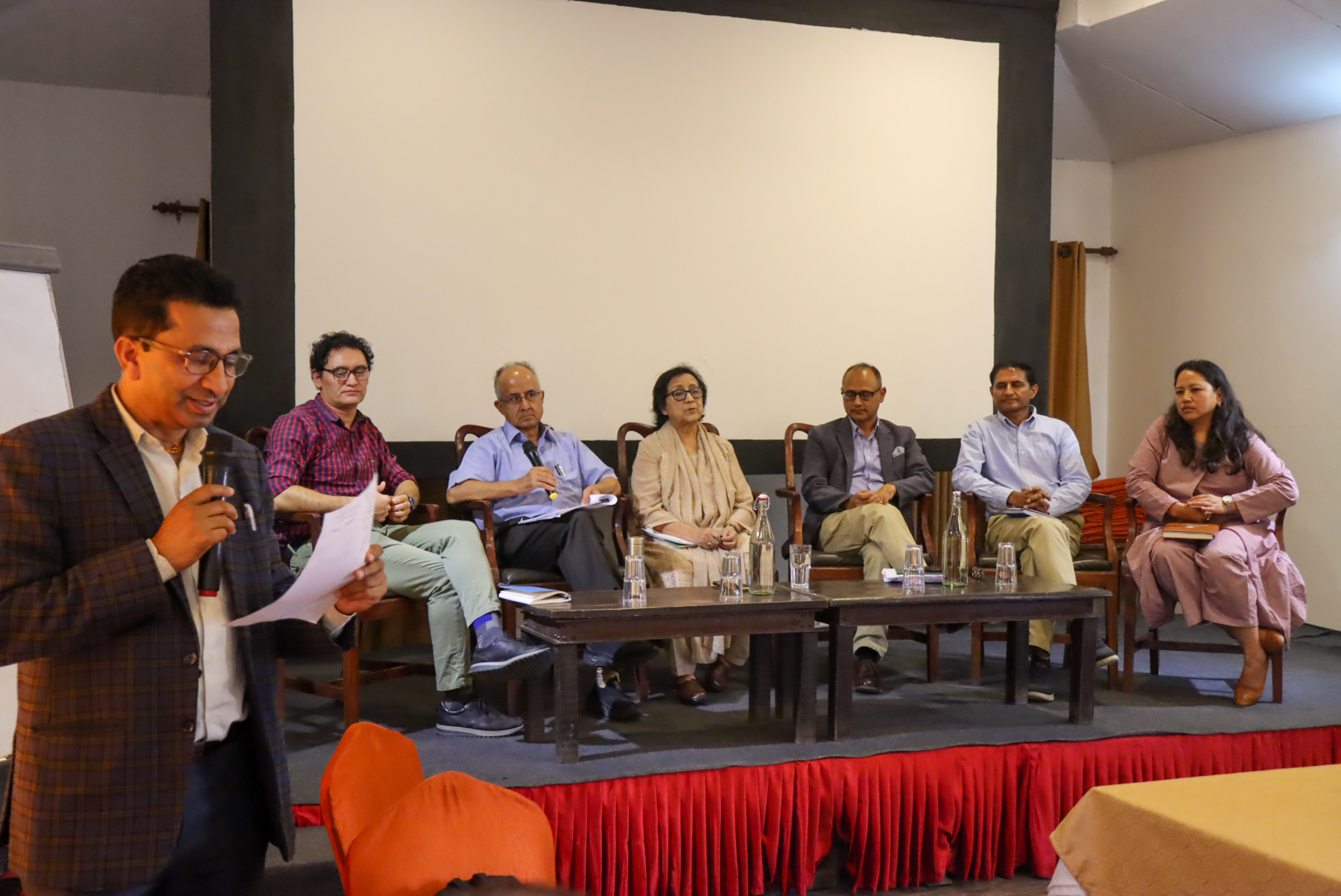Southasia Institute of Advanced Studies (SIAS), in collaboration with the International Water Management Institute (IWMI), organized a “Stakeholder dialogue on the Challenges and Opportunities of Multistakeholder Initiatives in the Water, Energy, Food and Ecosystem (WEFE) Sectors in Federal Nepal” as a part of the NEXUS Gains research initiative on May 18, 2023. The dialogue was organized to discuss the origin, approach, achievements, opportunities, and challenges of past and present multistakeholder platforms in WEFE sector in Nepal. The dialogue was intended to facilitate shared learning from these experiences and insights and explore innovative and pragmatic ways to support, re-activate, sustain, and strengthen these platforms to foster holistic thinking and effective and coordinated decisions for inclusive, integrated, and sustainable use, management, and governance of WEFE resources at the local level.
The workshop started with welcome remarks by Dr. Anushiya Shrestha, Research Director of SIAS, in which she highlighted the relevance of nexus approach for the sustainable management of WEFE resources. She shared that the major objective of the dialogue is to share and discuss practices of past MS initiatives, their value in catalyzing an integrated approach to resource use, co-learn from different experiences, and collectively identify the opportunities and challenges for reactivating, initiating, strengthening and effective functioning of WEFE platforms. Likewise, Ms. Labisha Uprety, Researcher from IMWI, reiterated that the dialogue aims to bring together actors working in different sectors to share their experiences and learnings on the functioning of the multistakeholder (MS) platforms and also discuss various strategies to effectively mobilize such MS networks/platforms for sustainable use of WEFE resources.
The technical session started with sharing the findings of the institutional analysis in the WEFE sector that SIAS undertook in collaboration with IWMI by Dr. Anushiya Shrestha. The presentation highlighted the existing institutions across the WEFE sectors at different levels, their working mechanisms, past and existing MS-platforms initiatives in WEFE sectors and some of the learning of such initiatives. After the presentation was a short feedback session on the presentation where the participants suggested to focus more on the usefulness of MS platforms. They also accepted the fact that the nexus approach is indeed necessary and that we need to collaborate and strengthen the synergies of different sectors to achieve maximum sustainable outcomes. But in the meantime, we also need to take into consideration the challenges that might occur in the future while adopting the approach.
After the feedback session, participants were divided into three groups to have an interactive discussion mainly focusing on two major questions:
- How can we convince the Palika chair the value of and use of MSP processes in relation to promoting WEFE nexus approaches?
- What are the key resources needed to make the MSP a success – policy instruments, concepts, approaches and tools, human resource, capacity building, budget?
Before the interaction in the group started, Dr. Maniram Banjade requested the participants to concentrate the group discussions mainly around two questions as mentioned above and draw some conclusions to initiate an institutional modality for the effective performance of the MS platforms. All the groups had intensive discussion and at last shared their views. While one group highlighted multi-stakeholder networks can be a platform for harnessing collective ideas for the sustainable utilization of WEFE resources, the other group identified policy review and advocacy (if necessary) as the entry point to start a discussion with the Palika. The third group added that we could also identify their political aspirations and propose our approach in alignment with their aspirations. One of the groups also remarked that such platforms would be need-based and their longevity would completely be context-specific, which means that the platforms need not necessarily be permanent. While the three groups had different opinions regarding the approaches of introducing MS platforms to Palika there were some commonalities among the groups. For instance, MS platforms need to be flexible in its approach and can differ from Palika to Palika, ownership of such forums should be taken by the local government, and researchers and practitioners support to strengthen the MS platforms to facilitate the interactive and iterative processes across sectors, etc. On the policy front, the groups highlighted that the focus should be on translating the policy into practice rather than formulation of new policies. Likewise, all the groups agreed that the systematic documentation of the lessons learned is crucial as this can serve as a guiding document to other Palikas who want to adopt a similar modality for their resource mobilization.
Overall, the dialogue was fruitful for sharing the experiences and discussing the potential opportunities and challenges that might occur in translating nexus thinking to practice. At the end of the workshop, Dr. Maniram Banjade thanked all the participants for their valuable inputs and suggestions for the way forward to the research team. Ms. Labisha Uprety added feedback from the dialogue held today and a few other dialogues conducted at the province level with different actors of WEFE sectors would be well documented to build it as a guiding framework.




